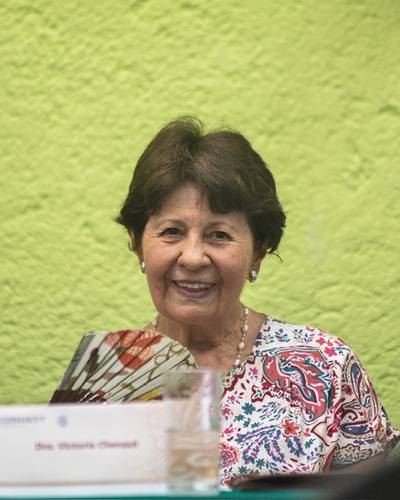The anthropologist Victoria Chenaut, a reference in the study of fishing communities, honor and justice in the towns of Totonacapan, and the ejidal dispute in the central area of Veracruz, received a tribute from researchers and academics from the Center for Research and Higher Studies in Social Anthropology (Ciesas), Gulf Regional Unit, based in Xalapa, Veracruz.
During the ceremony, in which students and former thesis students also participated, she was recognized as an inspiration for new generations, both for her academic and methodological rigor and for her warmth in accompanying new researchers in their study process, making them feel heard. .
In her intervention, Emilia Velázquez Hernández, doctor in Social Sciences and part of the Ciesas community, highlighted in Chenaut’s work the breadth of the themes and regions that she addresses in her research, which began in 1970 with her immersion in the Indian towns of Argentina , until its arrival in the Gulf of Mexico, and whose production includes publications such as Those who fly: The Totonacos in the 19th century; Rural Processes and Regional History: Sierra and Totonac Coasts of Veracruz; The Totonacs of Veracruz: Population, culture and society, y Migrants and adventurers on the southern border.
Daniel Bello López, academic manager of the law degree at the Universidad Veracruzana Intercultural (UVI), Espinal campus, said that Victoria Chenaut’s work has left its mark on the training of lawyers, and has allowed them to appropriate concepts and methodological strategies for the study of access to justice from the community and municipal levels in the context of interlegal processes, applying the subjects of law criminal and civil
.
Teresa Rodriguez Lopez, of Ciesas, highlighted the works of Chenaut’s production Gender and integral processes (2014), which recovers his ethnographic work in Coyutla, Veracruz, as well as the review of judicial files, which allowed him to approach the problem of social order in the administration of justice and the norms that regulate relationships between people; that is, domestic and community relations
.
He considered that Che-naut’s work is inserted in the line of legal anthropology, from the 90s, not because it has not been studied before in Mexico, since there is precedent in the work of Gonzalo Aguirre Beltrán on the norms of indigenous government, but because on this occasion a subdiscipline was developed; Vicky is part of this interdisciplinary and international work group that created this specialty in anthropology.
.
Rodríguez López highlighted the aspects of the worldview of the people of Totonacapan, in relation to local considerations and the law, the way in which their conflicts are resolved
. He highlighted the analysis of the topic of honor, which becomes for women a symbolic capital that legitimizes the offspring of their children and the transmission of inheritance
.
In the voice of his disciples
The students Charles Rivero Gaillard and Guadalupe Irene Juárez Ortiz, from Ciesas Pacífico and Golfo, respectively, highlighted how Chenaut’s support in their research allowed them to successfully complete their projects, due to his academic experience, his methodological knowledge and his technical rigor. , and, above all, they emphasized their abilities to listen to their concerns, respect their abilities, provide feedback on their research work, and keep them motivated.
My companions and I always enjoy their shelter; The times he gave us advice at his house, there was always food, drink and words of encouragement. Now that we are teachers, and it is our responsibility to advise our students, we understand the importance of understanding their personal interests, listening to them and keeping them motivated.
expressed Irene Juárez.
Victoria Chenaut graduated with a degree in history from the National University of Tucumán (Argentina), a master’s degree in rural science-sociology from the University of Wisconsin-Madison (United States) and a doctorate in social sciences from El Colegio de Michoacán (Mexico). . In 1987, she joined Ciesas, with assignment to the Gulf, and is a member of the National System of Researchers (level II) and the Mexican Academy of Sciences.
Chenaut listened attentively to her colleagues and former students, and was grateful for the recognition of her career. She highlighted that her work with her apprentices was decisive, because young people anchor me to the present, and guide me with their concerns
.
Regarding her work at Ciesas, she said that for her the most important thing has been the ties of friendship and belonging. “I am happy to know that the Ciesas Golfo has the wood to last a while and a group of young students to blow strong and not extinguish the fire of inquiry and reflection on the things of this world, in order to contribute to the search for solutions to the social and environmental crises that humanity is experiencing.
I leave happy to know that I have participated in an educational experience of the highest levels in our country.
The recognition of Victoria Chenaut was sealed with a bouquet of flowers, a burst of applause and a toast, in which the entire Ciesas community, friends and close family participated.
